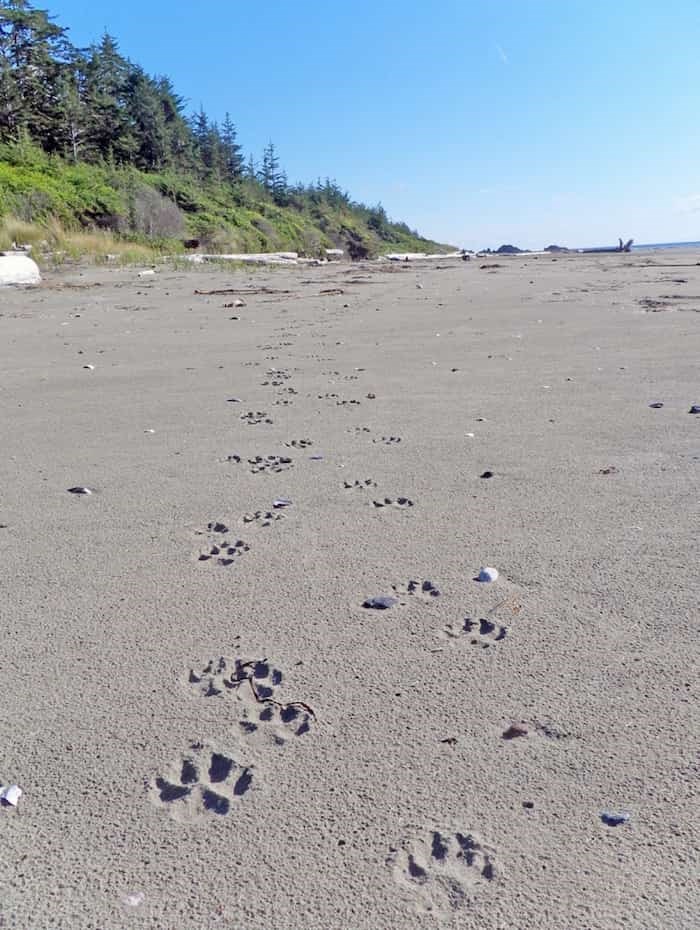“Ever thought of being a poop fairy?”
The Pacific Rim National Park Reserve recruitment poster stops people in their tracks.
 Wolf tracks in the sand at Pacific Rim National Park. Photo: Parks Canada
Wolf tracks in the sand at Pacific Rim National Park. Photo: Parks Canada
Superimposed over the image of a wild coastal wolf is a request for volunteers who regularly hike in and around the national park to collect wolf scat over the next 12 months.
“We’re asking people to pick up scat, so you have to make jokes about something like this,” said Todd Windle, project manager of Wild About Wolves, a five-year Parks Canada research project that aims to reduce conflict and improve coexistence between human beings and wolves.
First Nations people coexisted with wolves for thousands of years, Windle said.
When wolves began to repopulate the west coast of Vancouver Island 21 years ago, negative interactions between people and wolves increased, he said. The wolves, which had been absent since the 1960s, returned to a changed environment and a population far less familiar with them than the Nuu-chah-nulth nations.
“Wolves became more habituated and it perpetrated further conflict,” Windle said.
Wolves can become habituated by having prolonged interactions with people. Some people try to feed them directly. Others leave food or garbage around after a visit to the park.
“We all have a role in keeping wildlife wild,” he said.
“Wanting to get close to them for social media feeds can be harmful to them. Give them the space they need and don’t give them access to any human food.”
Windle is making the call-out for volunteers to act as “poop fairies” or “scat scientists” because wolves cover a lot of distance over a large area.
“If it was just one or two staff trying to walk around, that would be a pretty difficult and not overly productive task,” Windle said.
Instead, they’re going to make use of people who are already spending time outdoors, matching people to a beach or a trail that is already part of their routine.
“That way we’re getting a small army, a group of dedicated volunteers, able to cover a larger area and we’ll get a much larger sample size.”
The scat samples will help scientists understand the diet, ancestry and kinship of the local wolf population.
Volunteers will be asked to attend an instructional day to learn how to collect wolf scat. They’ll receive biological sampling bags and gloves and learn how to use a GPS to mark a location. They’ll be taught how to fill out data sheets with the date, time and location of the sample.
They’ll also learn how to tell the difference between wolf scat, cougar scat and domestic dog scat, Windle said.
“There are various things about the shape of it, the contents, even the smell,” he said. “As odd as it sounds, wolf scat has a fairly unique smell to it. It doesn’t smell as bad as dog scat.”
Volunteers will also be taught where to look for their specimens. Because the wolves use their scat for olfactory communications, where they defecate is not completely random. Wolf scat is more common at a trail junction at a beach and at the intersection of two trails, Windle said.
Parks Canada will also train the volunteers in general wildlife safety. They’ll learn how to prevent an interaction with a wolf, cougar or black bear, what to do in the unlikely event they do encounter one and how to use bear spray.
Determining what the wolves in and around Pacific Rim National Park Reserve are eating is a big part of the study, Windle said. Researchers are looking for differences in the diet of wolves in certain areas and in different packs. They’re looking for seasonal fluctuations and whether there is human food in their diet.
Coastal wolves are quite successful at catching salmon. Deer are part of their diet. There are also incidents of them hunting and preying on black bears, Windle said.
“We have found bear hair and claws in wolf scats, too,” he said. “We’ve seen packs of wolves go after a single bear, but we’ve also seen a single wolf go after a bear, jump onto it and try to bring it down, unsuccessfully.”
The scat samples will also give scientists an idea of how healthy the wolves are and how many parasites they are carrying. They’ll also be tested for DNA to identify individual animals and find kinship between different packs and within packs.
“They’re fascinating. Wolves are so adaptive and diverse. They’re intelligent animals that constantly surprise and amaze me. They’re so interesting,” said Windle, who first volunteered with the park in 2003 when he was doing undergraduate work at the University of Northern B.C. One of his tasks was to collect wolf scat.
The response to the request for poop fairies has been so great Windle can’t keep up with the emails. “It’s been outstanding, probably better than I would have even hoped for,” said Windle, who has had requests from Alberta and even Mexico.
The research project involves eight First Nations, universities, provincial parks, conservation officers and municipalities.



